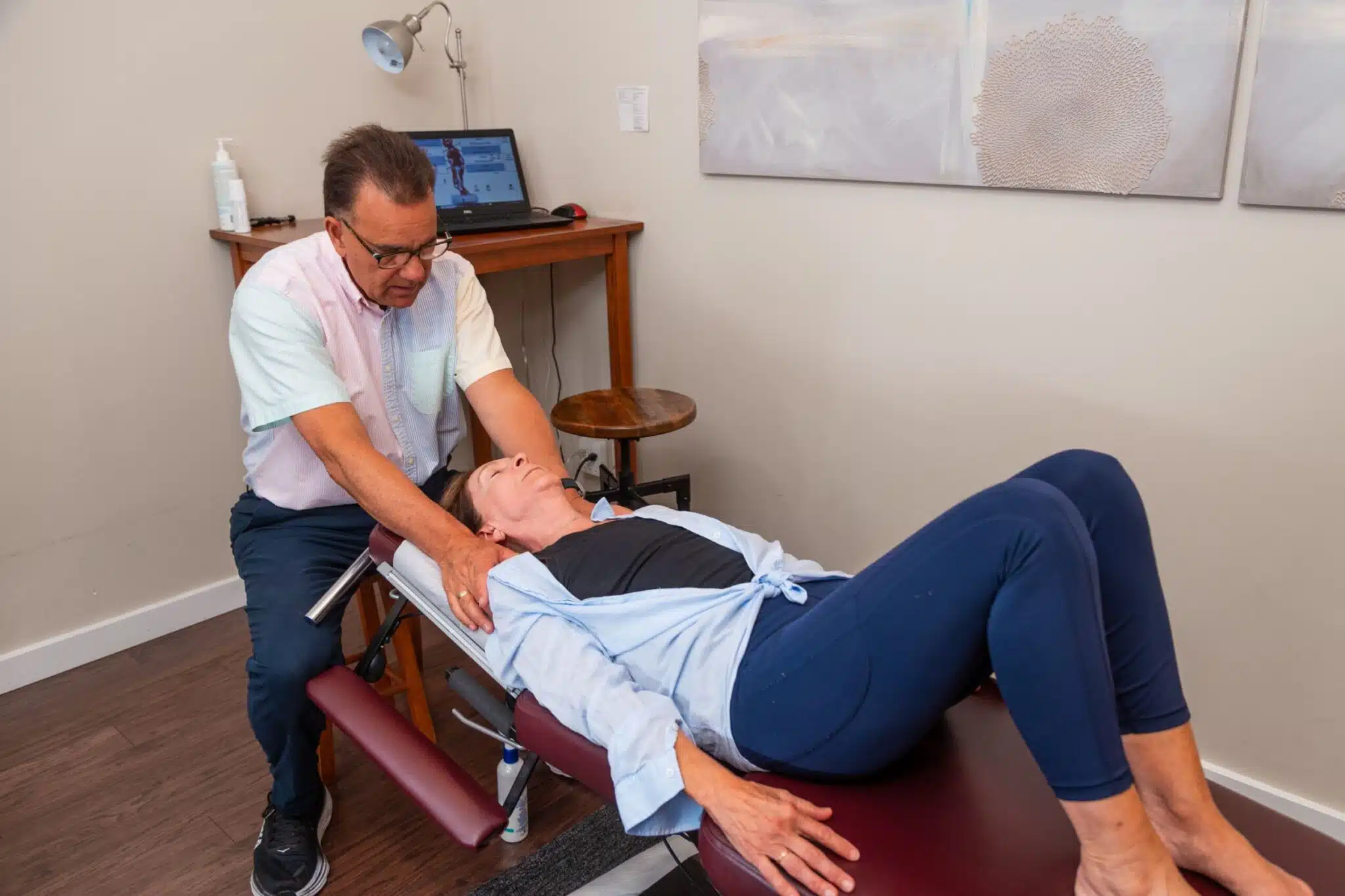
Are muscle tension, stiffness, or chronic pain keeping you from feeling your best? Soft tissue therapy may provide the relief you need. Everyday activities, sports injuries, poor posture, and stress can all contribute to tightness and discomfort in the muscles, tendons, and ligaments.
Soft tissue therapy is a specialized treatment that uses targeted techniques to release muscle tension, improve circulation, and enhance mobility. By applying pressure to specific areas, this therapy helps break down adhesions, reduce inflammation, and promote faster recovery from injuries. Whether you're dealing with chronic pain, post-exercise soreness, or workplace strain, soft tissue therapy can help restore balance and function.
Incorporating soft tissue therapy into your wellness routine can lead to long-term benefits, from improved flexibility to reduced pain and tension. If you're looking for a natural, hands-on approach to better movement and comfort, consider scheduling a session today at Washington Wellness Center in Robbinsville Township, NJ.





At Washington Wellness Center, our Soft Tissue Therapy service is designed to alleviate pain, enhance mobility, and promote overall well-being. This specialized treatment focuses on manipulating soft tissues, such as muscles, tendons, and ligaments, to release tension, improve circulation, and facilitate healing. Our skilled practitioners employ a variety of techniques, including deep tissue massage, myofascial release, and trigger point therapy, all tailored to meet the individual needs of each client. Whether you are dealing with a specific injury, chronic discomfort, or simply seeking to improve your physical health, our Soft Tissue Therapy can help restore your body’s natural balance and support a healthier, more active lifestyle. Fill up your patient forms to help facilitate a smooth and efficient visit.
Massage therapy encompasses various techniques aimed at relieving muscle tension and enhancing overall physical well-being. Deep tissue massage focuses on realigning deeper layers of muscles and connective tissue, particularly effective for chronic aches and pains. This method often incorporates friction and sustained pressure, targeting specific areas of tightness, such as the neck, back, and shoulders. In contrast, sports massage emphasizes enhancing athletic performance and recovery, employing techniques that improve flexibility, circulation, and range of motion. It addresses muscle soreness and aids in the prevention of injuries, making it particularly beneficial for active individuals.
Both deep tissue and sports massage utilize manipulation of soft tissues but differ in their approach and purpose. While deep tissue massage often delves into specific areas of dysfunction, addressing conditions like scar tissue and stiffness, sports massage provides a more dynamic experience, designed for athletes preparing for or recovering from physical activity. Each technique offers unique benefits tailored to individual needs. The choice of therapy often depends on a patient’s specific symptoms and goals, guiding them towards a preferable treatment strategy for their soft tissue injuries.
Deep tissue massage focuses on the deeper layers of muscle and connective tissue, often used to alleviate chronic tension and pain. Techniques include slow strokes and firm pressure, which target specific areas of tightness and dysfunction. This method works on the deep fascia, helping to break up adhesions and improve circulation. It is particularly beneficial for addressing conditions like lower back pain, shoulder pain, and muscle stiffness in the calf or hip.
In contrast, sports massage is tailored for athletes and those involved in physical activity. The approach incorporates techniques aimed at enhancing performance and aiding recovery. This massage often emphasizes flexibility, helping to maintain muscle elasticity, and reduce the risk of injury. Techniques may involve stretching and stimulation of blood flow to promote healing, making it ideal for conditions like Achilles tendinopathy and tennis elbow. Both methods support overall wellness but serve distinct purposes based on an individual’s needs. Learn more about our comprehensive wellness services, including spinal manipulation, and decompression therapy at Washington Wellness Center.
Soft tissue therapy encompasses a variety of techniques aimed at alleviating pain, improving mobility, and enhancing overall physical function. Research in recent years has increasingly focused on the physiological effects of therapies such as the Graston technique and shiatsu. These methods are designed to address soft tissue dysfunctions caused by factors like muscular imbalances and sports injuries. Clinical observations suggest that these modalities can help in conditions ranging from knee osteoarthritis to plantar fasciitis by promoting the healing of cells and improving blood flow.
Experimental studies have also indicated that soft tissue techniques can positively impact biomechanical performance. For example, therapy sessions that target specific muscle groups, such as the hamstring or iliotibial band, may reduce muscle spasms and improve joint mobility. Evidence from systematic reviews available on platforms like PubMed and Scopus supports the effectiveness of these therapies in managing chronic pain and joint issues. The meticulous incorporation of soft tissue therapies in treatment plans by allied health professionals, including physiotherapists and osteopaths, highlights their importance in restorative medicine.
Recent studies have highlighted the efficacy of various soft tissue therapies in managing musculoskeletal conditions. Research indicates that techniques such as fascial manipulation and therapeutic massage can significantly alleviate symptoms associated with myofascial pain syndrome and overuse injuries. In randomized controlled trials, patients receiving these therapies reported reduced pain levels and improved physical function. The potential for these treatments to enhance recovery from sports injuries, such as sprains or tendinitis, demonstrates their role within a comprehensive rehabilitative approach.
Clinical observations further support the therapeutic benefits of soft tissue therapies in sports medicine and physiotherapy settings. Professionals frequently utilize modalities like dry needling and targeted massage techniques to address specific areas of discomfort, such as lower back pain or shoulder pain. The analgesic effect of these interventions can assist individuals suffering from conditions like sciatica or fibromyalgia. Many patients experience notable improvements in daily functioning and mental well-being, illustrating the broader impact of these therapies beyond mere physical relief.
Soft tissue dysfunction can manifest in various forms, impacting individuals across a wide spectrum of activities and lifestyles. Conditions such as Achilles tendonitis or shoulder impingement illustrate how these issues can lead to significant pain and reduced mobility. Musculoskeletal pain often arises from injuries or chronic stress, affecting not only athletic performance but also daily tasks. Furthermore, conditions like carpal tunnel syndrome highlight the importance of understanding soft tissue integrity to maintain functional ability.
The consequences of untreated soft tissue problems extend beyond physical limitations, influencing overall quality of life. Many affected individuals report increased discomfort during routine activities. Acute pain, whether from ankle sprains or strains, can hinder participation in sports and recreational pursuits. The psychological impact is also notable, as persistent pain can lead to anxiety or depression, further complicating the recovery process. Comprehensive evaluation and targeted interventions through techniques such as massage therapy or manipulation are essential for addressing these dysfunctions effectively.
Soft tissue dysfunction can significantly hinder physical function and diminish quality of life. Conditions such as tendinopathy, bursitis, and muscle strains can lead to chronic pain, making everyday activities challenging. This discomfort often arises from the tightness of muscle fibers and the presence of scars in the soft tissue, which can restrict movement and cause pain. Individuals may experience reduced range of motion and increased difficulty with physical exertion, resulting in a cycle of inactivity and further deterioration of physical health.
The repercussions of these dysfunctions extend beyond mere physical limitations. Stress, anxiety, and emotional well-being are closely linked to physical health. Patients dealing with chronic aches may find their ability to engage in workouts and partake in social activities compromised. Occupational therapists and other health care professionals often observe how this dysfunction affects mood and mental health, perpetuating a feeling of frustration. Consequently, a holistic approach to treatment that addresses both physical and psychological aspects is crucial for restoring overall well-being. Our chiropractors accept insurance making these treatments more accessible to those seeking holistic care.
Soft tissue therapy refers to a range of techniques aimed at treating and managing soft tissue injuries and dysfunctions, including muscles, tendons, ligaments, and fascia. It often includes methods such as massage, stretching, and myofascial release.
Different massage therapy techniques vary in their approach, intensity, and focus area. For instance, deep tissue massage targets deeper muscle layers and is often used to relieve chronic pain, while sports massage focuses on preventing and treating injuries related to athletic performance.
Yes, soft tissue therapy can enhance athletic performance by increasing flexibility, reducing muscle tension, improving circulation, and aiding in recovery from injuries, allowing athletes to train more efficiently and effectively.
Common consequences of soft tissue dysfunction include pain, reduced range of motion, muscle tightness, and overall decreased physical performance. These issues can significantly impact daily activities and quality of life.
Generally, soft tissue therapy is safe for most individuals; however, it is essential to consult with a qualified healthcare professional before starting any therapy, especially for those with pre-existing health conditions or injuries.
Copyright © Washington Wellness Centers. All Rights Reserved